QUOTES ON LIBERTY AND VIRTUE
Compiled and Edited by J. David Gowdy, President
The Washington, Jefferson & Madison Institute
lib-er-ty\ ‘lib-er-te` \ n [ME, fr. MF liberte’, fr. L libertat, libertas, fr. liber free]
1. FREEDOM 2. POWER 3. CHOICE 4. RIGHT 5. PRIVILEGE 6. DUTY 7. STANDARD
vir-tue\ ‘ver-(,)chu: \ n [ME virtu, fr. OF, L virtut-, virtus strength, virtue]
1. MORALITY 2. POWER 3. VALOR 4. MERIT 5. CHASTITY 6. FORCE 7. AUTHORITY
«[V]irtue or morality is a necessary spring of popular government.»
George Washington
«Can it be that Providence has not connected the permanent felicity of a nation with its virtue? »
George Washington
«[T]here is no truth more thoroughly established, than that there exists . . . an indissoluble union between virtue and happiness.»
George Washington
«Of all the dispositions and habits which lead to political prosperity, religion and morality are indispensable supports. In vain would that man claim tribute to patriotism who should labor to subvert these great pillars of human happiness — these firmest props of the duties of men and citizens. . . . reason and experience both forbid us to expect that national morality can prevail in exclusion of religious principles.»
George Washington
«The aggregate happiness of the society, which is best promoted by the practice of a virtuous policy, is, or ought to be, the end of all government . . . .»
George Washington
«Human rights can only be assured among a virtuous people. The general government . . . can never be in danger of degenerating into a monarchy, an oligarchy, an aristocracy, or any despotic or oppresive form so long as there is any virtue in the body of the people.»
George Washington
«Only a virtuous people are capable of freedom. As nations become more corrupt and vicious, they have more need of masters.»
Benjamin Franklin
«Laws without morals are in vain.»
Benjamin Franklin (Motto of the University of Pennsylvania)
«Sell not virtue to purchase wealth, nor Liberty to purchase power.»
Benjamin Franklin
«A nation as a society forms a moral person, and every member of it is personally responsible for his society.»
Thomas Jefferson
«No government can continue good but under the control of the people; and . . . . their minds are to be informed by education what is right and what wrong; to be encouraged in habits of virtue and to be deterred from those of vice . . . . These are the inculcations necessary to render the people a sure basis for the structure and order of government.»
Thomas Jefferson
«It is in the manners and spirit of a people which preserve a republic in vigour. . . . degeneracy in these is a canker which soon eats into the heart of its laws and constitution.»
Thomas Jefferson
«[In a republic, according to Montesquieu in Spirit of the Laws, IV,ch.5,] ‘virtue may be defined as the love of the laws and of our country. As such love requires a constant preference of public to private interest, it is the source of all private virtue; for they are nothing more than this very preference itself… Now a government is like everything else: to preserve it we must love it . . . Everything, therefore, depends on establishing this love in a republic; and to inspire it ought to be the principal business of education; but the surest way of instilling it into children is for parents to set them an example.'»
Thomas Jefferson: copied into his Commonplace Book.
«When virtue is banished, ambition invades the minds of those who are disposed to receive it, and avarice possesses the whole community.»
Montesquieu (written by Thomas Jefferson in his Common Place Book).
«Dependence begets subservience and venality, suffocates the germ of virtue, and prepares fit tools for the designs of ambition.»
Thomas Jefferson
«Liberty . . . is the great parent of science and of virtue; and . . . a nation will be great in both always in proportion as it is free.»
Thomas Jefferson
«The order of nature [is] that individual happiness shall be inseparable from the practice of virtue.»
Thomas Jefferson
«Without virtue, happiness cannot be.»
Thomas Jefferson
«The institution of delegated power implies that there is a portion of virtue and honor among mankind which may be a reasonable foundation of confidence.»
Alexander Hamilton
«To suppose that any form of government will secure liberty or happiness without any virtue in the people, is a chimerical idea.»
James Madison
«The aim of every political Constitution, is or ought to be first to obtain for rulers men who possess most wisdom to discern, and most virtue to pursue, the common good of society; and in the next place, to take the most effectual precautions for keeping them virtuous whilst they continue to hold their public trust.»
James Madison
«. . . Virtue, morality, and religion. This is the armor, my friend, and this alone that renders us invincible. These are the tactics we should study. If we lose these, we are conquered, fallen indeed . . . so long as our manners and principles remain sound, there is no danger.»
Patrick Henry
«Bad men cannot make good citizens. It is when a people forget God that tyrants forge their chains. A vitiated state of morals, a corrupted public conscience, is incompatible with freedom. No free government, or the blessings of liberty, can be preserved to any people but by a firm adherence to justice, moderation, temperance, frugality, and virtue; and by a frequent recurrence to fundamental principles.»
Patrick Henry
«The only foundation of a free Constitution, is pure Virtue, and if this cannot be inspired into our People, in a great Measure, than they have it now. They may change their Rulers, and the forms of Government, but they will not obtain a lasting Liberty.
John Adams
«We have no government armed with power capable of contending with human passions unbridled by morality and religion. Avarice, ambition, revenge, or gallantry would break the strongest cords of our constitution as a whale goes through a net.»
John Adams
«Our Constitution was made only for a moral and religious people. It is wholly inadequate to the government of any other.»
John Adams
«Liberty can no more exist without virtue and independence than the body can live and move without a soul.»
John Adams
«Public virtue cannot exist in a nation without private, and public virtue is the only foundation of republics.»
John Adams
«[I]t is religion and morality alone which can establish the principles upon which freedom can securely stand. The only foundation of a free constitution is pure virtue.»
John Adams
«The laws of man may bind him in chains or may put him to death, but they never can make him wise, virtuous, or happy.»
John Adams
«Statesmen, my dear Sir, may plan and speculate for liberty, but it is religion and morality alone, which can establish the principles upon which freedom can securely stand. The only foundation of a free Constitution is pure virtue, and if this cannot be inspired into our People in a greater Measure than they have it now, they may change their rulers and the forms of government, but they will not obtain a lasting liberty.»
John Adams
«Honor is truly sacred, but holds a lower rank in the scale of moral excellence than virtue. Indeed the former is part of the latter, and consequently has not equal pretensions to support a frame of government productive of human happiness.»
John Adams
«Human nature itself is evermore an advocate for liberty. There is also in human nature a resentment of injury, and indignation against wrong. A love of truth and a veneration of virtue. These amiable passions, are the «latent spark»… If the people are capable of understanding, seeing and feeling the differences between true and false, right and wrong, virtue and vice, to what better principle can the friends of mankind apply than to the sense of this difference?»
John Adams
«Our liberty depends on our education, our laws, and habits . . . it is founded on morals and religion, whose authority reigns in the heart, and on the influence all these produce on public opinion before that opinion governs rulers.»
Fisher Ames
«It is certainly true that a popular government cannot flourish without virtue in the people.»
Richard Henry Lee
«Whenever we are planning for posterity, we ought to remember that virtue is not hereditary.»
Thomas Paine
«[N]either the wisest constitution nor the wisest laws will secure the liberty and happiness of a people whose manners are universally corrupt. He therefore is the truest friend of the liberty of his country who tries most to promote its virtue, and who, so far as his power and influence extend, will not suffer a man to be chosen onto any office of power and trust who is not a wise and virtuous man.»
Samuel Adams
«The diminution of public virtue is usually attended with that of public happiness, and the public liberty will not long survive the total extinction of morals.»
Samuel Adams
«[M]en will be free no longer then while they remain virtuous.»
Samuel Adams
«If virtue & knowledge are diffused among the people, they will never be enslav’d. This will be their great security.»
Samuel Adams
«No people will tamely surrender their Liberties, nor can any be easily subdued, when knowledge is diffused and Virtue is preserved. On the Contrary, when People are universally ignorant, and debauched in their Manners, they will sink under their own weight without the Aid of foreign Invaders.»
Samuel Adams
«A general dissolution of the principles and manners will more surely overthrow the liberties of America than the whole force of the common enemy…. While the people are virtuous they cannot be subdued; but once they lose their virtue, they will be ready to surrender their liberties to the first external or internal invader…. If virtue and knowledge are diffused among the people, they will never be enslaved. This will be their great security.»
Samuel Adams
«No people can be great who have ceased to be virtuous.»
Samuel Johnson
«No free government, or the blessings of liberty, can be preserved to any people, but by a firm adherence to justice, moderation, temperance, frugality and virtue, and by frequent recurrence to fundamental principles.»
George Mason
«[A] free government . . . cannot be supported without Virtue.»
Samuel Williams
«In selecting men for office, let principle be your guide. Regard not the particular sect or denomination of the candidate — look at his character. It is alleged by men of loose principles, or defective views of the subject, that religion and morality are not necessary or important qualifications for political stations. But the scriptures teach a different doctrine. They direct that rulers should be men who rule in the fear of God, men of truth, hating covetousness. It is to the neglect of this rule that we must ascribe the multiplied frauds, breaches of trust, speculations and embezzlements of public property which astonish even ourselves; which tarnish the character of our country and which disgrace our government. When a citizen gives his vote to a man of known immorality, he abuses his civic responsibility; he not only sacrifices his own responsibility; he sacrifices not only his own interest, but that of his neighbor; he betrays the interest of his country.»
Noah Webster
«…if the citizens neglect their Duty and place unprincipled men in office, the government will soon be corrupted; laws will be made, not for the public good so much as for selfish or local purposes; corrupt or incompetent men will be appointed to execute the Laws; the public revenues will be squandered on unworthy men; and the rights of the citizen will be violated or disregarded.»
Noah Webster
«Let a man’s zeal, profession, or even principles as to political measures be what they will, if he is without personal integrity and private virtue, as a man he is not to be trusted.»
John Witherspoon
«… the manners of the people in general are of the utmost moment to the stability of any civil society. When the body of a people are altogether corrupt in their manners, the government is ripe for dissolution.»
John Witherspoon
«So true is this, that civil liberty cannot be long preserved without virtue.»
John Witherspoon
«… but a republic once equally poised, must either preserve its virtue or lose its liberty, and by some tumultuous revolution, either return to its first principles, or assume a more unhappy form.»
John Witherspoon
«A country cannot subsist well without liberty, nor liberty without virtue.»
Jean Jacques Rousseau
«Machiavel, discoursing on these matters, finds virtue to be so essentially necessary to the establishment and preservation of liberty, that he thinks it impossible for a corrupted people to set up a good government, or for a tyranny to be introduced if they be virtuous; and makes this conclusion, ‘That where the matter (that is, the body of the people) is not corrupted, tumults and disorders do not hurt; and where it is corrupted, good laws do no good:’ which being confirmed by reason and experience, I think no wise man has ever contradicted him.»
Algernon Sidney
«[L]iberty cannot be preserved, if the manners of the people are corrupted . . .»
Algernon Sidney
«[A]ll popular and well-mixed governments [republics] . . . are ever established by wise and good men, and can never be upheld otherwise than by virtue: The worst men always conspiring against them, they must fall, if the best have not power to preserve them. . . . [and] unless they be preserved in a great measure free from vices . . . .»
Algernon Sidney
«Fruits are always of the same nature with the seeds and roots from which they come, and trees are known by the fruits they bear: as a man begets a man, and a beast a beast, that society of men which constitutes a government upon the foundation of justice, virtue, and the common good, will always have men to promote those ends; and that which intends the advancement of one man’s desire and vanity, will abound in those that will foment them.»
Algernon Sidney
«[I]f vice and corruption prevail, liberty cannot subsist; but if virtue have the advantage, arbitrary power cannot be established.»
Algernon Sidney
«If the public safety be provided, liberty and propriety secured, justice administered, virtue encouraged, vice suppressed, and the true interest of the nation advanced, the ends of government are accomplished . . .»
Algernon Sidney
«[L]iberty without virtue would be no blessing to us.»
Benjamin Rush
«Without virtue there can be no liberty.»
Benjamin Rush
«The only foundation for… a republic is to be laid in Religion. Without this there can be no virtue, and without virtue there can be no liberty, and liberty is the object and life of all republican governments.»
Benjamin Rush
«No free government can stand without virtue in the people, and a lofty spirit of partiotism.»
Andrew Jackson
«Lastly, our ancestors established their system of government on morality and religious sentiment. Moral habits, they believed, cannot safely be on any other foundation than religious principle, nor any government be secure which is not supported by moral habits.»
Daniel Webster
«[I]f we and our posterity reject religious instruction and authority, violate the rules of eternal justice, trifle with the injunctions of morality, and recklessly destroy the political constitution which holds us together, no man can tell how sudden a catastrophe may overwhelm us, that shall bury all our glory in profound obscurity.»
Daniel Webster
«Liberty cannot be established without morality, nor morality without faith.»
Horace Greely
«What is liberty without wisdom and without virtue? It is the greatest of all possible evils; for it is folly, vice, and madness, without tuition or restraint.»
Edmund Burke
«Among a people generally corrupt liberty cannot long exist.»
Edmund Burke
«Manners are of more importance than laws. Upon them in great measure the laws depend. The law touches us but here and there, and now and then. Manners are what vex and smooth, corrupt or purify, exalt or debase, barbarize or refine us, by a constant, steady, uniform, insensible operation, like that of the air we breathe in. They give their whole form and color to our lives. According to their quality, they aid morals, they support them, or they totally destroy them.»
Edmund Burke
«It is better to cherish virtue and humanity, by leaving much to free will, even with some loss of the object , than to attempt to make men mere machines and instruments of political benevolence. The world on the whole will gain by a liberty, without which virtue cannot exist.»
Edmund Burke
«Men are qualified for civil liberty in exact proportion to their disposition to put moral chains upon their appetites; in proportion as their love of justice is above their rapacity; in proportion as their soundness and sobriety of understanding is above their vanity and presumption; in proportion as they are more disposed to listen to the counsel of the wise and good, in preference to the flattery of knaves. Society cannot exist unless a controlling power upon will and appetite be placed somewhere, and the less of it there is within, the more there must be without. It is ordained in the eternal constitution of things, that men of intemperate minds cannot be free. Their passions forge their fetters.»
Edmund Burke
«Among a people generally corrupt liberty cannot long exist.»
Edmund Burke
«[T]he very best forms of government are vain without public virtue . . . .»
William A. Cocke
«No polity can be devised which shall perpetuate freedom among a people that are dead to honor and integrity. Liberty and virtue are twin sisters, and the best fabric in the world . . . .»
James H. Thornwell
«[P]erfect freedom consists in obeying the dictates of right reason, and submitting to natural law. When a man goes beyond or contrary to the law of nature and reason, he . . . introduces confusion and disorder into society . . . [thus] where licentiousness begins, liberty ends.»
Samuel West
«When was public virtue to be found when private was not?»
William Cowper
«The laws by which the Divine Ruler of the universe has decreed an indissoluble connection between public happiness and private virtue, whatever apparent exceptions may delude our short-sighted judgments, never fail to vindicate their supremacy and immutability.»
William Cabell Rives
«Unless virtue guide us our choice must be wrong.»
William Penn
«If men be good, government cannot be bad.»
William Penn
«Republics are created by the virtue, public spirit, and intelligence of the citizens. They fall, when the wise are banished from the public councils, because they dare to be honest, and the profligate are rewarded, because they flatter the people, in order to betray them.»
Joseph Story
«The life of the nation is secure only while the nation is honest, truthful and virtuous.»
Frederick Douglas
«[R]eligion, morality and knowledge, being necessary to good government and the happiness of mankind, schools and the means of education shall be forever encouraged.»
Northwest Ordinance of 1787
«I consider the domestic virtue of the Americans as the principle source of all their other qualities. It acts as a promoter of industry, as a stimulus to enterprise and as the most powerful restraint of public vice. . . . No government could be established on the same principle as that of the United States with a different code of morals.»
Francis Grund
«The American Constitution is remarkable for its simplicity; but it can only suffice a people habitually correct in their actions, and would be utterly inadequate to the wants of a different nation. Change the domestic habits of the Americans, their religious devotion, and their high respect for morality, and it will not be necessary to change a single letter in the Constitution in order to vary the whole form of their government.»
Francis Grund
«History fails to record a single precedent in which nations subject to moral decay have not passed into political and economic decline. There has been either a spiritual awakening to overcome the moral lapse, or a progressive deterioration leading to ultimate national disaster.»
Douglas MacArthur
«[Liberty] considers religion as the safeguard of morality, and morality as the best security of law and the surest pledge of the duration of freedom.»
Alexis de Tocqueville
«I sought for the greatness and genius of America in her comodious harbors and her ample rivers, and it was not there; in her fertile fields and boundless prairies; and it was not there; in her rich mines and her vast commerce, and it was not there. Not until I visited the churches of America and heard her pulpits aflame with righteousness did I understand the secret of her genius and power. America is great because she is good, and if America ever ceases to be good, America will cease to be great.»
An old adage attributed to Alexis de Tocqueville
«Somehow strangely the vice of men gets well represented and protected but their virtue has none to plead its cause — nor any charter of immunities and rights.»
Henry David Thoreau
«To educate a man in mind and not in morals is to educate a menace to society.»
Theodore Roosevelt
«We have never stopped sin by passing laws; and in the same way, we are not going to take a great moral ideal and achieve it merely by law.»
Dwight D. Eisenhower
«No government at any level, or at any price, can afford, on the crime side, the police necessary to assure our safety unless the overwhelming majority of us are guided by an inner, personal code of morality. And you will not get that inner, personal code of morality unless children are brought up in a family — a family that gives them the affection they seek, that makes them feel they belong, that guides them to the future, and that will build continuity in future generations. . . . the greatest inequality today is not inequality of wealth or income. It is the inequality between the child brought up in a loving, supportive family and one who has been denied that birthright.»
Lady Margaret Thatcher
«A state is nothing more than a reflection of its citizens; the more decent the citizens, the more decent the state.»
Ronald Reagan
«Today it would be progress if everyone would stop talking about values. Instead, let us talk, as the Founders did, about virtues.»
George Will
«The ultimate success of this government and the stability of its institutions, its progress in all that can make a nation honored, depend upon its adherence to the principles of truth and righteousness.»
John Lord
«Righteousness exalteth a nation.»
Proverbs 14:34
Misquoting Our Founding Fathers
How many times have your heard that «Our founding fathers were not Christians! They were deists!»? It is an absurd assertion.

It conjures up images of clandestine gatherings in Philadelphia’s Independence Hall where one by one Washington and Jefferson and Adams et al swear allegiance to some obscure deist creed and pledge to set America on the course of eradicating Biblical belief from all corners of the land.
Sure some of our nation’s founders were deists. Consider the grumpy pamphleteer Thomas Paine in The Age of Reason:
«I do not believe in the creed professed by the Jewish church, by the Roman church, by the Greek church, by the Turkish church, by the Protestant church, nor by any church that I know of…Each of those churches accuse the other of unbelief; and for my own part, I disbelieve them all.»
But Paine was in the minority of founders that had a genuine antipathy to organized religion. The vast majority went on record to declare that religious faith is essential to the formation of a self-sustaining democracy.
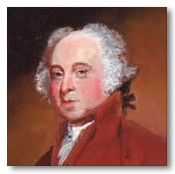 |
|
John Adams in a speech to the military in 1798 warned his fellow countrymen stating,
«We have no government armed with power capable of contending with human passions unbridled by morality and religion . . . Our Constitution was made only for a moral and religious people. It is wholly inadequate to the government of any other.»
|
|
|
|
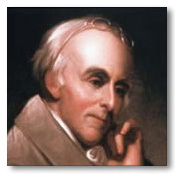 |
|
Benjamin Rush, Signer of the Declaration of Independence said.
«[T]he only foundation for a useful education in a republic is to be aid in religion. Without this there can be no virtue, and without virtue there can be no liberty, and liberty is the object and life of all republican governments. Without religion, I believe that learning does real mischief to the morals and principles of mankind.»
|
|
|
|
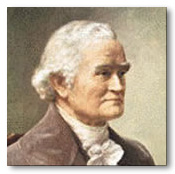 |
|
Noah Webster, author of the first American Speller and the first Dictionary said,
«[T]he Christian religion, in its purity, is the basis, or rather the source of all genuine freedom in government. . . . and I am persuaded that no civil government of a republican form can exist and be durable in which the principles of that religion have not a controlling influence.»
|
|
|
|
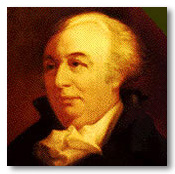 |
|
Gouverneur Morris, Penman and Signer of the Constitution.
«[F]or avoiding the extremes of despotism or anarchy . . . the only ground of hope must be on the morals of the people. I believe that religion is the only solid base of morals and that morals are the only possible support of free governments. [T]herefore education should teach the precepts of religion and the duties of man towards God.»
|
|
|
|
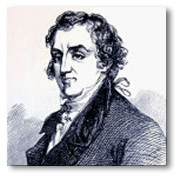 |
|
Fisher Ames author of the final wording for the First Amendment wrote,
«[Why] should not the Bible regain the place it once held as a school book? Its morals are pure, its examples captivating and noble. The reverence for the Sacred Book that is thus early impressed lasts long; and probably if not impressed in infancy, never takes firm hold of the mind.»
|
|
|
|
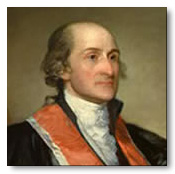 |
|
John Jay, Original Chief-Justice of the U. S. Supreme Court,
«The Bible is the best of all books, for it is the word of God and teaches us the way to be happy in this world and in the next. Continue therefore to read it and to regulate your life by its precepts.»
|
|
|
|
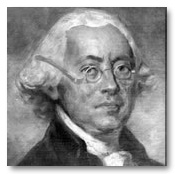 |
|
James Wilson, Signer of the Constitution; U. S. Supreme Court Justice,
«Human law must rest its authority ultimately upon the authority of that law which is divine. . . . Far from being rivals or enemies, religion and law are twin sisters, friends, and mutual assistants. Indeed, these two sciences run into each other.»
|
|
|
|
 |
|
Noah Webster, author of the first American Speller and the first Dictionary stated,
«The moral principles and precepts contained in the scriptures ought to form the basis of all our civil constitutions and laws. . . All the miseries and evils which men suffer from vice, crime, ambition, injustice, oppression, slavery, and war, proceed from their despising or neglecting the precepts contained in the Bible.»
|
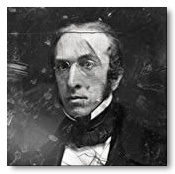 |
|
Robert Winthrop, Speaker of the U. S. House,
«Men, in a word, must necessarily be controlled either by a power within them or by a power without them; either by the Word of God or by the strong arm of man; either by the Bible or by the bayonet.»
|
|
|
|
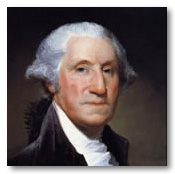 |
|
George Washington, General of the Revolutionary Army, president of the Constitutional Convention, First President of the United States of America, Father of our nation,
«Religion and morality are the essential pillars of civil society.»
|
|
|
|
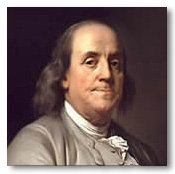 |
|
Benjamin Franklin, Signer of the Declaration of Independence
«[O]nly a virtuous people are capable of freedom. As nations become corrupt and vicious, they have more need of masters.»
|
Yet the radical secularists are at it again! Their new strategy is to misrepresent the founders by misquoting them or taking quotes out of context to intentionally distort their original meaning. A good example is this oft cited quote by John Adams:
Twenty times, in the course of my late reading, have I been upon the point of breaking out, «This would be the best of all possible worlds, if there were no religion in it!!!»
But this quote fragment distorts the main point Adams was making. Quoting from Adam’s letter (shown below) he actually said:
Twenty times, in the course of my late reading, have I been upon the point of breaking out, «This would be the best of all possible worlds, if there were no religion in it!!!» But in this exclamatic I should have been as fanatical as (Parson) Bryant or (Pedagogue) Cleverly. Without religion this world would be something not fit to be mentioned in polite company, I mean Hell. (emphasis added)
The founders did not want an established national religion. That’s it. They allowed for state established religions. They encouraged the expression of religious faith. And they almost universally sought to encourage religious belief as essential for good governance and citizenship.
Madison sums it up nicely. In his letter to Rev. Jasper Adams in the spring of 1832, Madison once again makes his position regarding the government’s proper role quite clear:
«(I)t may not be easy, in every possible case, to trace the line of separation between the rights of religion and the Civil authority with such distinctness as to avoid collisions and doubts on unessential points. The tendency to usurpation on one side or the other, or to a corrupting coalition or alliance between them, will be best guarded agst. by an entire abstinence of the Gov’t from interfering in any way whatsoever, beyond the necessity of preserving public order, and protecting each sect agst. trespasses on its legal rights by others.»
The founding fathers opposed both government suppression and government establishment of religion. Radical secularists who seek to drive all religious expression from the public square join the ranks of the radical sectarians that our founders sought to declaw.
On this Father’s Day we should thank God that our founding fathers had the foresight and courage to promote the expression of religious faith in the foundation and maintenance of our nation.














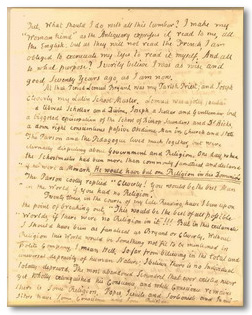
 Las charos son las que han dicho «si» a la Transición sin concesiones. Son las viejas del futuro que jalearán a Letizia Ortíz y al Principe porque «son muy guapos, y muy demócratas».
Las charos son las que han dicho «si» a la Transición sin concesiones. Son las viejas del futuro que jalearán a Letizia Ortíz y al Principe porque «son muy guapos, y muy demócratas».